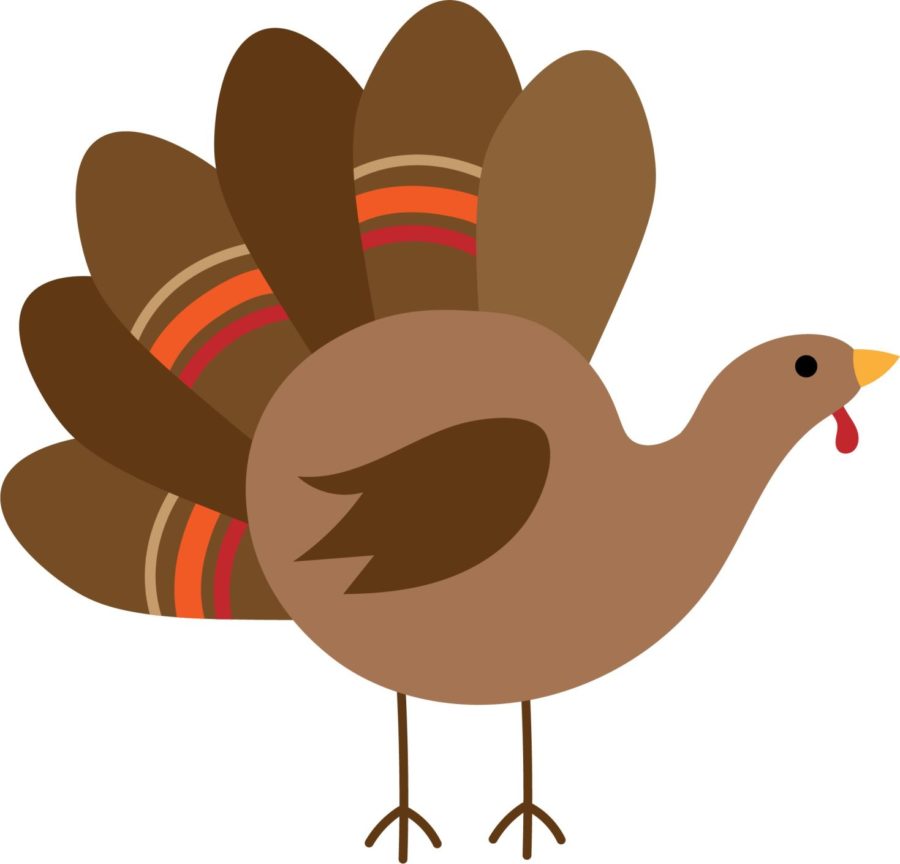How to thank the earth this Thanksgiving
November 21, 2019
When we feel truly grateful for someone, the way we show appreciation for them is rarely by taking out a club and walloping them, cartoon-caveman style. Exceptions may be made for particular siblings, but more often than not we show gratitude by verbally expressing it, listening, caring and spending quality time together. Why should Mother Earth be the exception?
Personally, I feel grateful for the Earth and all of it’s beauty, resilience and patience towards us humans and our shenanigans (e.g. the industrial revolution). It continues to sustain us despite the stress we put it under. Why not show some gratitude by holstering the club and doing our best to be sustainable this Thanksgiving?
Over Thanksgiving, ~204 million pounds of Turkey meat will be sent to the landfill, according to the National Resources Defense Council. That’s a lot, but it doesn’t include Aunt Glenda’s mystery casserole and the other inevitable leftover dishes each year. On average, food waste increases by 33 percent during holidays.
With this in mind, consider buying less food for Thanksgiving or at least informing the attendees that they can bring their own containers to take some home with them. While turkey and other meats shouldn’t be composted, you can create a compost bin for your non-meat leftovers. When food decomposes in landfills it is primarily methane that is released, a greenhouse gas 84 times as potent as carbon dioxide, according to the Environmental Defense Fund. Well-turned compost piles are a low-maintenance way to divert food from landfills, create healthy soil and reduce the amount of methane produced.
And, for the Turkey, there’s always the freezer.
Another way we can thank Earth this holiday is by purchasing carbon offsets. More than 55 million travelers will fly or drive more than 50 miles these Thanksgiving holidays, according to AAA. The Nature Conservancy has an online carbon offset calculator, and most 6-hour flights are under $15 to offset.
We can also minimize the environmental impact of Thanksgiving by sourcing local ingredients. Shopping at your farmers market — which in downtown Lexington is at Cheapside Pavilion every Saturday, 8 a.m. to 1 p.m. — is a wonderful way to thank local farmers through your monetary support, and thank the earth by purchasing food that is often more sustainably grown (and requires fewer emissions to get from the farm to your table).
In addition, I encourage everyone to buy heritage turkeys from small local farms such as Elmwood Stock Farm, whose turkeys are also certified organic and free range. Heritage breeds retain characteristics of turkeys that are now largely bred out of those used for industrial-level poultry production. This includes the ability to reproduce without artificial insemination (thereby reducing the near-monopolies of certain poultry companies) and to generally live happier, healthier, longer lives than the Turkeys bred purely to increase speed of production and breast size. I see few better ways to thank an animal for giving its life for you than to support the types of farms that provide animals with more humane lives.
Some environmentalists contend that if we truly wanted to thank mother earth, our Thanksgiving dinners would be vegan, fully local, wholly sustainable. I don’t think that this is a realistic option for all and can create unnecessary guilt. Thanksgiving is a time when family and friends come together, bringing many differing expectations. Food can get political.
Many also don’t have the option financially to opt for more expensive local or organic foods.
To me, all that matters is that we do what we can to reduce the negative impacts of our celebrations on the Earth, which I think comes more naturally when we acknowledge the blessings it gives us. So, if you can, ditch the paper plates, brave the ToFurkey, or buy Heritage breeds. Buy less. Maybe get creative and have an alternative, sustainable-themed Friendsgiving or buy a couple of carbon offsets.
The main point of the holiday is togetherness and thanksgiving and, while I don’t want to detract from that, I encourage everyone to take at least one step to reduce their environmental impact this Thanksgiving. A few small actions are better than none.































































































































































